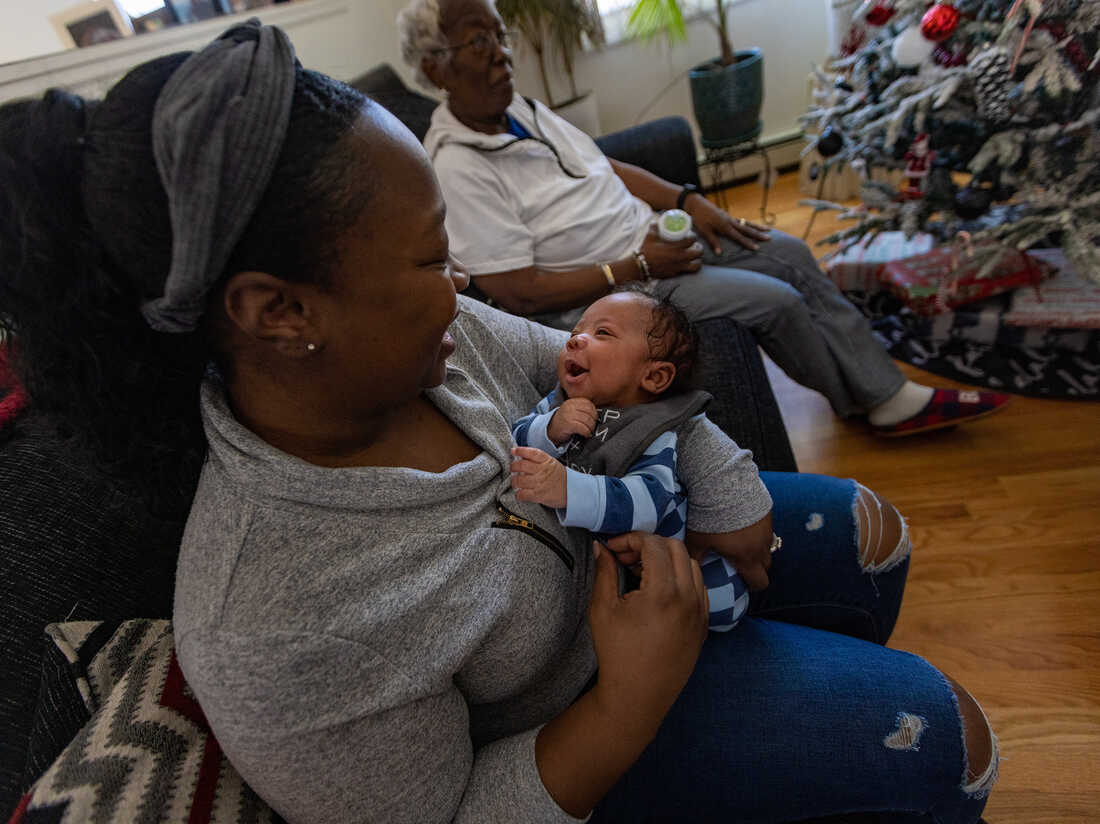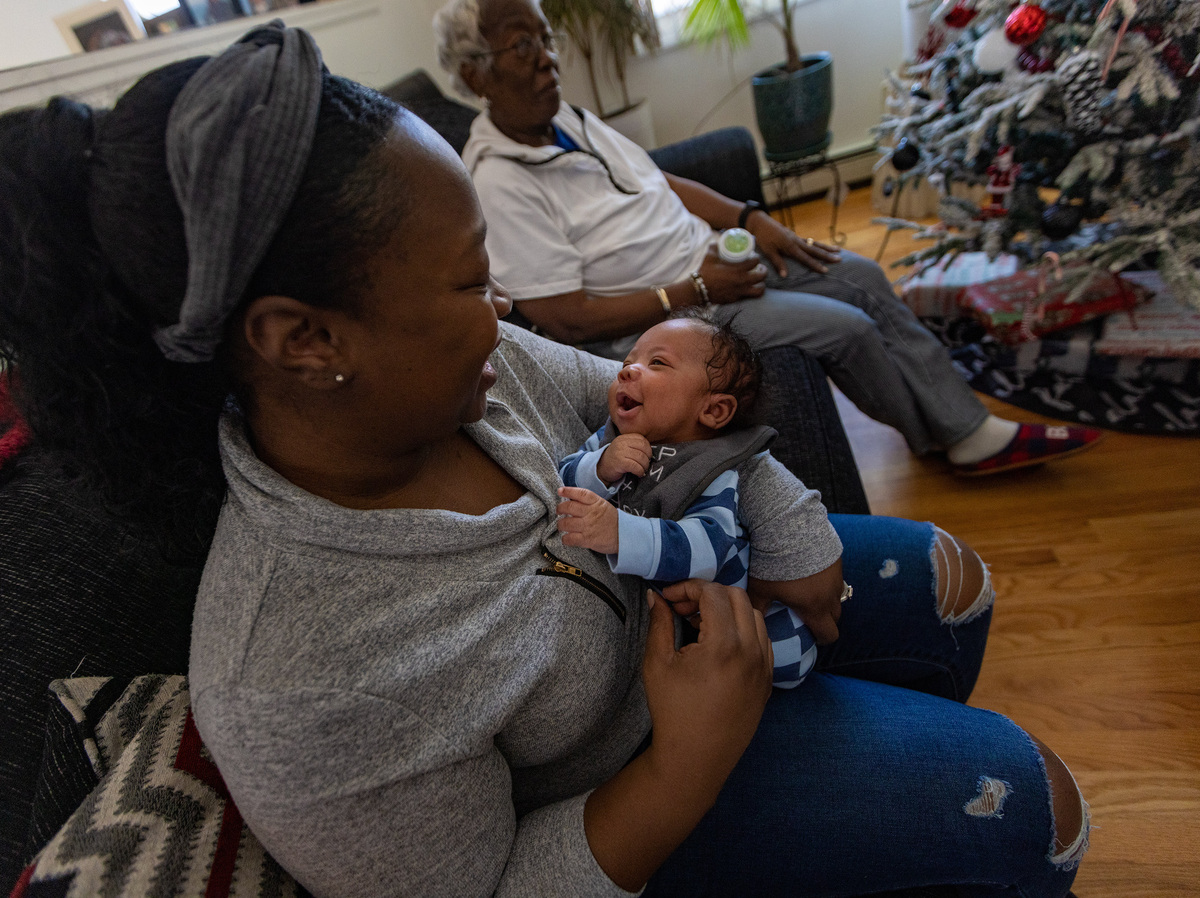Blood stress checks to battle Black maternal mortality : Pictures
[ad_1]

Kennise Nevers holds her son, AJ, in her arms at dwelling. Nevers’ mom, Nancy Josey, seems to be on.
Jesse Costa/WBUR
conceal caption
toggle caption
Jesse Costa/WBUR

Kennise Nevers holds her son, AJ, in her arms at dwelling. Nevers’ mom, Nancy Josey, seems to be on.
Jesse Costa/WBUR
With each ft flat on the ground, Kennise Nevers settles into the couch in her front room. She peels open a blood stress cuff, and straps it round her left arm, exhaling because it squeezes her bicep.
After a minute, she will get the studying. “It is good,” says the mother of two from Brockton, Massachusetts.
Nevers, 37, tracked her blood stress at dwelling every day for months as a part of a program for sufferers at Boston Medical Middle who’re pregnant or lately had infants and are in danger for hypertension. That good studying Nevers bought was transmitted to her medical file and reviewed by a nurse.
Blood stress is only one technique to measure an individual’s well being, however throughout being pregnant and shortly after, it is a crucial metric. Unchecked, hypertension can contribute to severe issues for the pregnant lady and child, and enhance the chance of loss of life.
So for Nevers, it was a aid to know that well being care suppliers had been monitoring her numbers so carefully.
“In fact, you are at all times going to fret: It is being pregnant. Issues change on a regular basis,” she says. “But it surely eased a few of my fear. I really feel like I had medical doctors at all times on my aspect, taking care of me. I wasn’t forgot about.”
Being pregnant-related loss of life
Research present that Black individuals are greater than twice as doubtless as white individuals to expertise extreme pregnancy-related issues, and almost thrice as more likely to have a pregnancy-related loss of life.
The U.S. has the worst maternal mortality fee of high-income nations on this planet — and the numbers are climbing. New federal information exhibits maternal deaths spiked 40% in 2021.
Many severe issues stem from hypertension, says Dr. Tina Yarrington, director of maternal-fetal medication at BMC.
“It is the foundation trigger for a lot of, many maternal well being inequities,” she says. “People who find themselves marginalized by structural racism, people who find themselves Black, African American, Latina, Hispanic, undergo greater ranges of hypertension and better ranges of issues when that hypertension strikes.”
Blood stress measures the drive of blood pushing in opposition to the artery partitions. When that drive is simply too excessive throughout being pregnant — a situation referred to as pre-eclampsia — it may possibly result in stroke, organ harm, being pregnant loss or low start weight for the child. It additionally raises the chance of loss of life for the pregnant individual and child.
Pre-eclampsia impacts about 14% of BMC’s white sufferers, however 18% of its Black sufferers — a small however vital distinction.
“That is the gasoline for this hearth,” Yarrington says. “That is why we’re placing a lot power and work into pre-eclampsia, within the curiosity of not simply higher outcomes, however higher outcomes particularly for the populations which have suffered from inequities.”
Shut watch, fast motion
Hypertension is usually referred to as the “silent killer” as a result of it may possibly all of a sudden rise to harmful ranges with out inflicting ache or different signs. That is why BMC has assigned a nurse, Megan O’Brien, to observe sufferers’ numbers every day.
Every time a affected person takes a studying at dwelling, their blood stress cuff sends the numbers straight to their digital well being file. The cuffs do not want an web connection; they use the sign of close by cell towers.
“The very first thing I do each morning is have a look at the entire excessive readings which have are available because the evening earlier than,” O’Brien says.
If she sees a regarding quantity, she follows up instantly — typically with the assistance of interpreters for sufferers who do not communicate English.
The affected person may want a brand new medicine. Or they may want to come back to the hospital to be monitored. Typically, blood stress spikes so quickly that sufferers need to ship their infants early to keep away from severe issues.
After supply, some sufferers are nonetheless susceptible to growing seizures, stroke, coronary heart assaults or different issues. O’Brien screens their numbers, too.
The every day at-home blood stress checks enable nurses and medical doctors to identify points early and act sooner. “We’re intervening a lot faster in these potential issues that might be occurring at dwelling,” O’Brien says. “It is actually about catching these as quick as doable.”

A mobile blood stress monitoring system in its packaging. The monitor sends the information from every studying on to Boston Medical Middle for well being staff to overview.
Jesse Costa/WBUR
conceal caption
toggle caption
Jesse Costa/WBUR

A mobile blood stress monitoring system in its packaging. The monitor sends the information from every studying on to Boston Medical Middle for well being staff to overview.
Jesse Costa/WBUR
BMC’s home-monitoring program started in the course of the COVID pandemic. The hospital began offering blood stress cuffs to postpartum sufferers in 2020, when in-person medical visits had been disrupted, and final spring, expanded to incorporate pregnant sufferers.
‘Interrogate’ disparities
This effort is a part of a sweeping hospital-wide initiative to take higher care of individuals of colour and get rid of racial and ethnic disparities in well being care.
Hospital leaders dove into information about their sufferers and uncovered stark disparities in being pregnant, in addition to COVID, diabetes, most cancers and behavioral well being. They discovered, for instance, that their Black sufferers had been twice as more likely to develop pregnancy-related issues as white sufferers.
“There is no method you will discover these issues and never interrogate them and have an intentionality to vary them,” says Dr. Thea James, vp of mission and co-executive director of the Well being Fairness Accelerator. “It’s unethical to see these issues and go away them there.”
A few of the work is in eliminating the potential for bias and subjectivity throughout decision-making — for instance, deciding when pregnant sufferers with pre-eclampsia ought to ship their infants.
“We noticed that it was taking twice as lengthy to make that call in Black ladies,” James says. “So the very first thing we did was to standardize the decision-making course of.”
BMC has enrolled tons of of sufferers within the initiative to watch blood stress at dwelling throughout and after being pregnant; about 80% of them are Black or Hispanic, reflecting the make-up of the hospital’s total affected person inhabitants.
Easy, however not straightforward
It might seem to be a easy intervention. However not all well being care suppliers have funding to pay for a home-monitoring program and devoted employees to run it. Medical health insurance plans usually do not cowl these prices.
And whereas some sufferers do not thoughts checking their blood stress at dwelling, others might discover it too traumatic or time-consuming.
“Making a behavior is hard for something,” says Dr. Lara Kovell, director of the being pregnant and coronary heart illness clinic at UMass Memorial Medical Middle in Worcester, Mass.
Kovell is a part of a staff of researchers at UMass Memorial, Yale College and the College at Buffalo who’re finding out the usage of at-home assist, together with blood stress monitoring, for postpartum sufferers.
“Maternal mortality being three- to four-fold greater in our Black ladies is simply one thing that actually wants to vary,” Kovell says. “And I believe hypertension is without doubt one of the issues that may get to that.”
Dr. Rose Molina, an OB-GYN at Beth Israel Deaconess Medical Middle in Boston, stated analysis on dwelling monitoring to this point stays inconclusive — although there seems to be little draw back to giving sufferers blood stress cuffs at dwelling.
“I do not suppose that there’s essentially hurt,” she says, “however there’s nonetheless questions round how can we construct the system round self-monitoring that actually is high-value by way of having a medical influence, and likewise saving prices, ideally, in a roundabout way.”
Docs at BMC are nonetheless finding out the impacts of dwelling monitoring, however they’ve seen some promising early outcomes.
Child AJ’s arrival
Kennise Nevers was eight months pregnant and cooking hen for a giant household dinner one night in October when her blood stress all of a sudden spiked.
“We had been truly on the brink of play playing cards,” Nevers remembers. “And I used to be like, ‘Oh, let me simply verify my blood stress earlier than I play.’ And the evening ended fairly fast.”
She went to the hospital instantly. The subsequent day, medical doctors induced labor, and her child, AJ, was born.
He arrived three weeks early, however sturdy and wholesome.
“It was a aid,” Nevers stated. “I used to be so apprehensive all through the being pregnant due to my blood stress.”
Nevers made it previous the high-risk postpartum days with out growing a complication.
However she has power hypertension, so she nonetheless retains a blood stress cuff close by.
[ad_2]
No Comment! Be the first one.